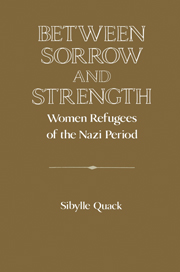Book contents
- Frontmatter
- Introduction
- Prologue: Jewish Women in Nazi Germany Before Emigration
- Part One A Global Search for Refuge
- Part Two Refuge in the United States
- 12 Women's Role in the German-Jewish Immigrant Community
- 13 “Listen sensitively and act spontaneously - but skillfully”: Selfhelp: An Eyewitness Report
- 14 “My only hope”: The National Council of Jewish Women's Rescue and Aid for German-Jewish Refugees
- 15 The Genossinen and the Khaverim: Socialist Women from the German-Speaking Lands and the American Jewish Labor Movement, 1933-1945
- 16 New Women in Exile: German Women Doctors and the Emigration
- 17 Women Emigré Psychologists and Psychoanalysts in the United States
- 18 Destination Social Work: Emigrés in a Women's Profession
- 19 Chicken Farming: Not a Dream but a Nightmare: An Eyewitness Report
- 20 The Occupation of Women Emigrés: Women Lawyers in the United States
- 21 Fashioning Fortuna's Whim: German-Speaking Women Emigrant Historians in the United States
- 22 Exile or Emigration: Social Democratic Women Members of the Reichstag in the United States
- 23 Women's Voices in American Exile
- Epilogue: The First Sex
- Index
15 - The Genossinen and the Khaverim: Socialist Women from the German-Speaking Lands and the American Jewish Labor Movement, 1933-1945
Published online by Cambridge University Press: 05 January 2013
- Frontmatter
- Introduction
- Prologue: Jewish Women in Nazi Germany Before Emigration
- Part One A Global Search for Refuge
- Part Two Refuge in the United States
- 12 Women's Role in the German-Jewish Immigrant Community
- 13 “Listen sensitively and act spontaneously - but skillfully”: Selfhelp: An Eyewitness Report
- 14 “My only hope”: The National Council of Jewish Women's Rescue and Aid for German-Jewish Refugees
- 15 The Genossinen and the Khaverim: Socialist Women from the German-Speaking Lands and the American Jewish Labor Movement, 1933-1945
- 16 New Women in Exile: German Women Doctors and the Emigration
- 17 Women Emigré Psychologists and Psychoanalysts in the United States
- 18 Destination Social Work: Emigrés in a Women's Profession
- 19 Chicken Farming: Not a Dream but a Nightmare: An Eyewitness Report
- 20 The Occupation of Women Emigrés: Women Lawyers in the United States
- 21 Fashioning Fortuna's Whim: German-Speaking Women Emigrant Historians in the United States
- 22 Exile or Emigration: Social Democratic Women Members of the Reichstag in the United States
- 23 Women's Voices in American Exile
- Epilogue: The First Sex
- Index
Summary
Much has been written in both popular literature and more scholarly works on the strained encounters between Yiddish-speaking and German-speaking Jews. Whatever their relations may have been in the world at large or in earlier periods, there is no evidence of any such strains between the socialist exiles from the German-speaking lands (many of whom were of Jewish origin) and the American Jewish labor movement in the years of the Third Reich. To the Jews of Central Europe, Yiddish-speaking Jews living in Germany and Austria before the Nazi era may well have been, to use Jack Wertheimer's phrase, “unwelcome strangers.” The socialist exiles from Germany and Austria, both those who were Jewish and those who were not, were perceived by the Jewish labor movement in America, however, not as strangers but as comrades in struggle. The women exiles from German-speaking Europe who were in contact with the American Jewish labor movement during the war, moreover, seem to have formed even deeper and longer-lasting bonds with that movement than did their male counterparts.
The organization most instrumental in creating ties between Jewish socialists in America and socialist exiles from the German-speaking lands was the Jewish Labor Committee (JLC). There were no women in the national leadership of the JLC either before or during World War II. The JLC, moreover, did not specifically orient its rescue and relief activities toward women. There were, however, a number of women who were aided by the JLC during the war years, including a significant number of women from German-speaking Europe.
- Type
- Chapter
- Information
- Between Sorrow and StrengthWomen Refugees of the Nazi Period, pp. 205 - 214Publisher: Cambridge University PressPrint publication year: 1995



